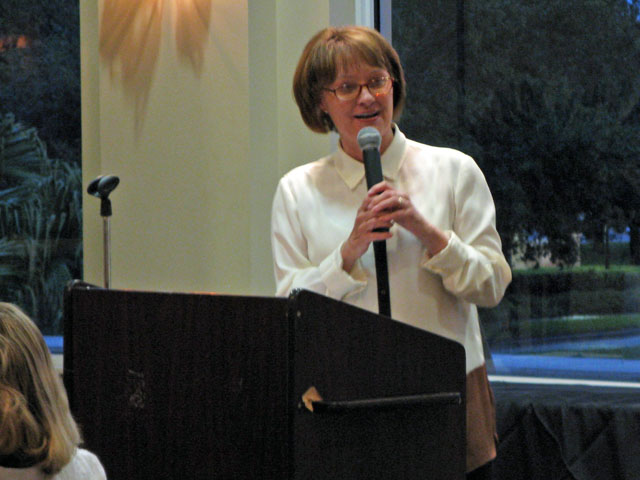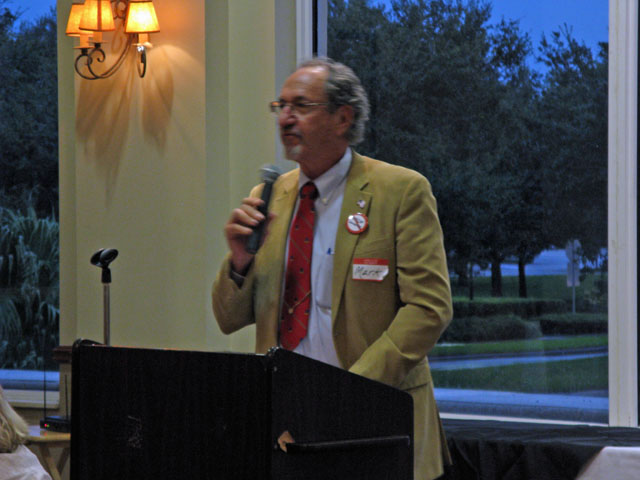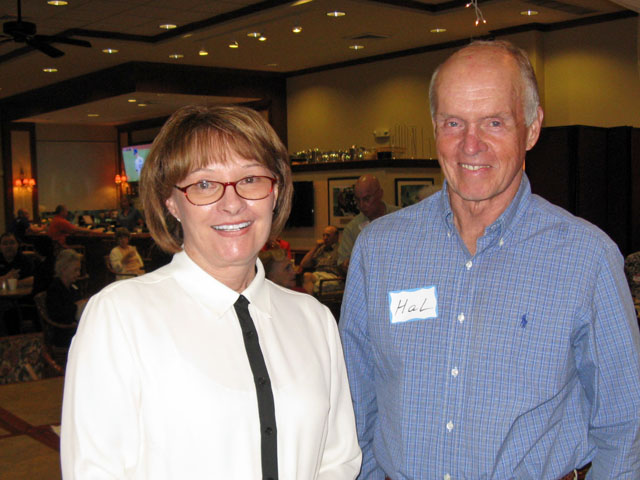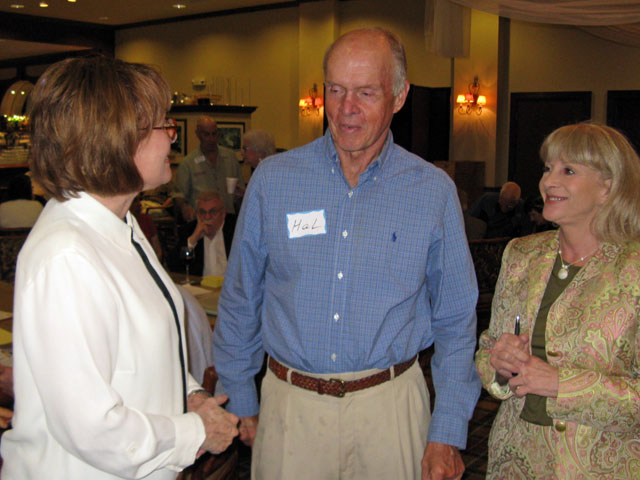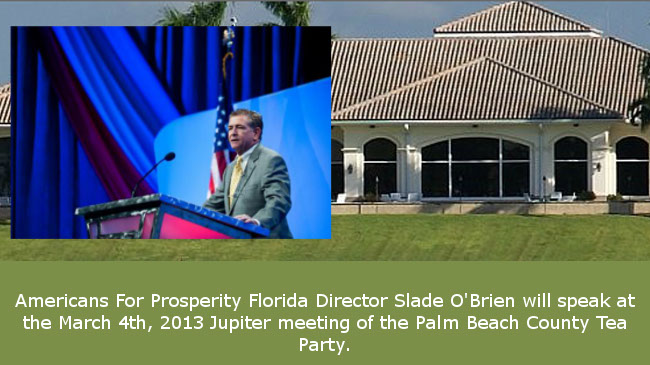Potential Progress for Seven50 Opposition
The American Coalition for Property Rights (ac4pr.org), with some help from members of the Palm Beach County Tea Party, has been able to convince three County Commissions (St. Lucie, Martin and Indian River) to ‘opt out’ of Seven50 – the HUD funded regional plan that sets out a progressive vision for “seven counties, 50 years”. Now their sights are set on Palm Beach County.
Predicting significant population growth in South Florida over that time frame along with rising sea levels and constraints on natural resources, the Seven50 plan sees public transportation, high density housing situated close to transit corridors, and restrictions on private land use as the solution. Implementation would involve changes in zoning regulations, and adoption of a regional blueprint which would supersede today’s system of county and municipal land use rules.
Free Speech in PBC
A bit of drama ensued during the meeting as Palm Beach County Tea Party’s President, Mel Grossman was ejected from the meeting by a heavy handed PBSO deputy. The deputy patrolled the room, trying to intimidate the attendees and chastized (loudly) anyone who deemed to whisper to their seatmate. Mel spoke too loudly and thus the ensuing drama. Mayor Taylor also admonished anyone who clapped or called out in support of those speaking. Ultimately, 3 other deputies joined the first one to ensure that the ‘unruly and dangerous’ elderly people in the audience were held in check.
To his credit, County Administrator Bob Weisman met Mel outside the chambers and arranged for him to come back in and speak, although he was asked to remain in the outside seating area after that. The deputy was clearly out of line (at one point dangling handcuffs over Mel’s head), and the Administrator wisely acted to prevent what could have been an ugly scene.
One can only wonder if this deputy has the full support of Mayor Taylor and the Commission. We have observed her in the past harrassing speakers at the podium by standing next to them and glaring, and disrupting the meeting by loudly admonishing against applause. At one point the Mayor joked as if the deputy was actually in charge of the meeting.
Fearing loss of local control and influence by property owners and other citizens, opponents of the plan have been asking county governments to “opt out” of the Seven50 MOU (“memo of understanding”) which they signed in 2010. Our three northern neighbors acquiesced, but so far Palm Beach County has not been willing to accept the premise that any of their authority would be preempted by the plan, nor do they feel bound to implement any of its provisions. Commissioner Hal Valeche, certainly not a proponent of the “New Urbanism”, does not see Seven50 as anything more than a federally funded study that lays out some proposals – that the county can accept or reject (or ignore) at their leisure.
Phyllis Frey, a leader in this fight, along with Mel Grossman, president of PBCTP, arranged for interested citizens to come to the February 4th Palm Beach County Board of County Commissioners (BCC) meeting, to speak “off agenda” during the “Matters by the Public” session.
The 80 or so activists wore red shirts in support of the 15 or so who spoke, and the speakers covered a range of issues, from the impacts to Home Rule, development density concerns, the relationship to UN Agenda 21 and other topics.
For the most part, the session was cordial, and the Commissioners made comments and suggestions, although it was clear none of them saw any reason to “opt out”. There was a little bit of drama, as leader Mel Grossman was thrown out of the meeting room by an overzealous deputy. (see sidebar). In the Sun-Sentinel (“SFL Tea Party Leader Ejected from PBC Commission Meeting) and the PB Post (“About 80 seven/50 opponents pack palm beach county commission“) that part was the lead.
Drama notwithstanding, potential progress was made in the meeting. Seeking a way to address the concerns – namely that home rule would be compromised or that the county would be compelled to implement the seven50 plan, Commissioner Steven Abrams suggested that the County Attorney draft an addendum to the agreement(s) with the Seven50 committee, clarifying that nothing in those agreements in any way compromises our Home Rule or otherwise overrides the County’s planning and zoning. The addendum would be signed by both the BCC and Seven50 officials. The rest of the BCC agreed and County Attorney Denise Nieman said she would return at the next BCC meeting on March 11th. After the meeting, Ms. Nieman spoke with members of the public – including Mel and Phyllis. The latter plan to work with Ms. Nieman’s team to see if the proposed wording would satisfy their concerns.
All should recognize however, that whenever government grants are accepted, there are strings attached. And having an addendum or an opt-out, no matter how it is worded, does not relieve interested citizens from having to continue to monitor various development projects from appearing on Consent Agendas for passage without discussion. Also – most if not all on our County Commission, are in support of the goals of Seven50 and other regional planning initiatives – and one shouldn’t just assume that all regional planning is good or bad. As citizens, it is up to us to watch what is going on, hold our elected officials accountable, speak out, educate others and vote!
Action Alert – Defeat Seven/50 at the PBC County Commission
2/4/2014 ACTION ALERT REMINDER
FOR PATRIOTS OPPOSED TO UN AGENDA 21 A.K.A. SEVEN/50
Our Challenge! We must have hundreds of Palm Beach County residents to support our speakers in our quest to defeat seven/50.
ACTION RECOMMENDED:
Join fellow Palm Beach County residents as we support the American Coalition 4 Property Rights in their effort to defeat 7/50 in Palm Beach County. We have been challenged by our friends in Indian River County, Pt. St Lucie County and now Martin County. The results speak for themselves: Victory in Indian River and Pt. St. Lucie Counties, and hopefully in Martin County. We had record crowds at all of above county meetings, including 350 people cheering on our speakers at the commission meeting in Pt. St. Lucie. Surely we can top the 350 supporters when we all show up on Feb. 4th at the meeting.
Please wear RED to show our solidarity.
EVENT:
Palm Beach County Commissioners Meeting
PLACE:
County Commission Building 301 N. Olive, WPB (one block north of Clematis St.)
TIME:
Tuesday February 4, 2014. 2:00 PM
TRANSPORTATION AVAILABLE:
Please call Mel Grossman at 561 627 2774 if you need transportation.
BACKGROUND:
The following links provide background information on the struggle against seven/50.
Tea Party, other activists wage campaign against regional development plan
Vero Beach Mayor Fletcher on Seven50 2m53s
The American Coalition 4 Property Rights
AC4PR’s Stunning Presentation to St Lucie County Board
Convention of States
Are you concerned about the abuses of the federal government? The government regulates things they have no business controlling, there’s a massive imbalance between federal and state power, and the spending and debt is out of control.
But there’s hope! For the first time in many years, the people and states have a chance to check the runaway train of the federal government.
Article V of the Constitution provides a way for the states to call a convention for the purpose of proposing amendments to the Constitution. Mark Levin has explained the Convention of States process in his bestselling book The Liberty Amendments, and now there’s an organization that can turn an Article V Convention of States into a reality.
Citizens for Self-Governance (CSG) recently launched the Convention of States (COS) Project with the expressed purpose of urging and empowering state legislators to call a Convention of States. Under the COS Project plan, this convention would be called “for the purpose of limiting the power and jurisdiction of the federal government.” Only amendments that fall under this category would be germane and up for debate.
I wholeheartedly support the COS Project’s plan, and I hope you will as well.
I support the Convention of States Project because believe a Convention of States is our last chance to halt the runaway power of the federal government and restore the Founder’s vision. This will be the most important project of this generation, and I hope you’ll consider getting involved!
If you’d like more information, you can talk to me or visit their website at www.conventionofstates.com.
School Board Member Marcia Andrews and Common Core
It was a packed room to hear District 6 School Board Member Marcia Andrews at Wellington’s Total Wine & More on Monday.
The Common Core Standards are an attempt to unify K-12 education across the nation around a set of grade-specific core skills, ostensibly aimed at raising the worldwide competitiveness of American students. Unfortunately, the devil is in the details, and much anecdotal evidence has surfaced that when the standards are translated into curricula, they represent a “fundamental transformation” that many would argue is not needed or wanted.
Implementation of the standards in Florida was mandated by then Governor Charlie Crist in 2010 and has been rolled out in kindergarten and first grade, with movement to the higher grades about to begin. As they roll out, opposition has been growing across the state, prompting Governor Scott to reject the assessment part of the program called PARCC (Partnership for Assessment of Readiness of College and Careers), leaving open the question of how assessment in the state will proceed. This, and the move to slow things down while the debate continues, shared by Ms. Andrews and others on the School Board and in the state-wide Florida School Board Association, has the possibility to create chaos in K-12 education as teachers are trained, materials are adopted and the rollout continues in the face of a groundswell of opposition.
Ms. Andrews and District Director of Secondary Education Diana Feldman gave the group an overview of history and plans for Common Core in Florida, and fielded many questions from the floor regarding required reading lists, data collection on students, the autonomy of local teachers to shape the curriculum in their classroom, and other hot-button issues.
Although few who have formed positions regarding Common Core would have been swayed by the session, it was informative and gave us the impression that the School Board is listening.
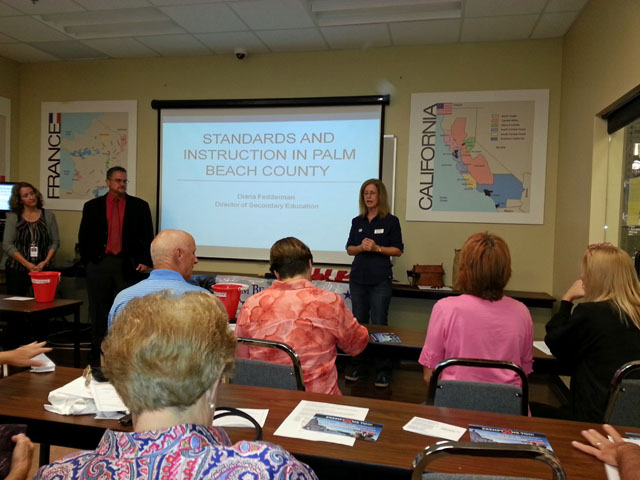
In Jupiter, Seven50 Presentation Becomes Town Hall
Last evening, the Jupiter chapter hosted a presentation by Phyliss Frey of the American Coalition 4 Property Rights, on the regional planning protocol known as “Seven50”.
Background: The title stands for “Seven Counties, 50 Years”, and is a work product in the area of “Regional Plans for Sustainable Development”, funded by a $4.6M HUD grant in 2010. A consortium, the developers of Seven50 formed the “South Florida Regional Partnership” to help create, support and implement the plan. Participants include local governments and NGOs (Non-Governmental Organizations) through membership in the Treasure Coast Regional Planning Council (TCRPC) and the South Florida RPC. The plan attempts to address how to manage an expected 50% growth in population (from 6M to 9M) in the seven target counties of Indian River, St. Lucie, Martin, Palm Beach, Broward, Miami-Dade, and Monroe. They have analyzed housing density, mass transit, diversity, planning and zoning and other regional attributes. The underlying assumption is a future of global climate change and rising sea levels, scarcity of energy and water, and challenges to “food security” among other things. The group’s proposals are considered advisory by many of the city and county jurisdictions that indirectly support it. Their work product can be viewed at seven50.org
Our guest speaker is a leader in the movement to challenge this planning protocol, and along with others associated with the American Coalition 4 Property Rights and many tea party activists, sees regional planning consortiums (they are all over the country, spurred on by HUD grants) as a threat to our way of life.
In her presentation, Ms. Frey used several very professional videos to make the case that the Seven50 plan would move us toward “stack ’em and pack ’em” high rise dwellings, the end of the suburbs, clusters of development along rail routes and elimination of local and county planning and zoning authority in favor of super-regional control.
Going back to the origins of “Sustainable Development” starting with the UN “Agenda 21”, she profiled the federal government’s role in implementation, starting with an executive order by George H. W. Bush, and expansion through every administration since. The Obama team has ratcheted it up a notch, using the EPA (Environmental Protection Agency) and HUD (Dept. of Housing and Urban Development) to promulgate a set of rules that require “neighborhood diversity” defined racially rather than economically, limits on resource use, and strings attached to federal grants flowing to local communities.
A test case and clear warning bell is provided by Westchester County, NY. A video of County Executive Rob Astorino, describing the federal lawsuits that county is struggling with, and his vow to fight back against federal overreach was a most compelling argument.
Invited to the meeting to hear the “other” side of the issue were our district 1 county commissioner Hal Valeche, Mayor Bert Premuroso and Councilman Joe Russo of Palm Beach Gardens. After the speaker made the point several times that MOUs (“Memorandums Of Understanding”) executed by local commissions and councils have limited their defense against the attacks on the local planning and zoning autonomy, Commissioner Valeche thought he needed to set the record straight. Taking the microphone to explain that the PBC commission is not constrained by Seven50 or the TCRPC, but look to groups like that as consultants and advisors. Some issues really need a regional perspective he said – like inter-county rail projects or large developments near county borders. He used the example of Avenir – the proposed development for the Vavrus Ranch in Palm Beach Gardens, as an example where TCRPC is being asked to help by collecting input from the region’s residents about such a large development in the western county.
Gardens councilman Joe Russo expanded on that, and explained that regional planning really did have a hand in developments like Abacoa, but state law has changed and it is now local rules that prevail. The Avenir development will be a decision for the Gardens Council, not the TCRPC.
Both Valeche and Russo left us with the impression that these kind of radical proposals as discussed by the speaker can happen, but only if we (and our local elected officials) let it.
At this point the meeting had become a “Town Hall” with both Hal and Phyliss taking questions from the audience.
Many were not buying that Seven50 was not a major threat though, and several called for Hal to get the PBC commission to “opt out” of Seven50, much the way that Indian River County and the city of Vero Beach have. Hal declined, saying such a motion would not pass in the current commission, and although this may be an issue in the future, currently he does not see it as an immediate issue in Palm Beach County. At one point it got raucus enough that Joel Channing, a PBCTP member who is close to the Gardens Council and is a leader in the PGA Corridor Association, made the point that “these guys are really heros” (the commissioner and councilmen) and were being unfairly criticized.
Also present at the meeting were candidates for CD18 Ellen Andel and Ilya Katz, CD21 candidate (against Ted Deutch) Henry Colon, and Senate 32 candidate Brandon Cannon (a Republican challenging Joe Negron).
Reasons for Optimism – The “Defending the American Dream” Summit
This past weekend in Orlando, Americans for Prosperity Foundation hosted a conference for grassroots activists from around the nation.
With informative breakout sessions in the mornings to highlight successes on the state and local levels, and “big tent” events in the afternoon with national conservative leaders, there was something for everyone, including ample free time to “network”.
The “malaise” that affected many of us locally after the bitter results of the 2012 Presidential election has been pretty widespread, and organizers from many locations reported falling attendance at many of their events. Hopefully, that is now starting to change. Although we are still licking our wounds, conferences like this one demonstrate that there is still life in the conservative grassroots, we have leaders in the movement that “get it” and have the fortitude to take it to the President – to lead the fight against the train wreck that is Obamacare, the endless debt and deficits, the administration that cares little for the rule of law, the separation of powers, or the role of the states in our constitutional republic.

Bobby Jindal
“It’s amazing what is possible in America“, said Louisiana Governor Bobby Jindal, when people are free – free to make their own choices, free from the suffocating regulations of intrusive government. He talked about education as the key for the jobs of tomorrow, and the success they have had in his state in shutting down failing schools and greatly expanding the charter school system which has done a lot to improve the lot of minority children. Last week, unfortunately, Obama’s Justice Department has decided to sue Louisiana to roll back these reforms and return students to their failing schools. Judging by his fiery critique of the President and his policies, it is clear he will stand up against our rogue Attorney General and fight to retain the success they achieved.

Marco Rubio
Our own Senator Marco Rubio declared “There is nothing wrong with America – but there is something wrong with this President“. The good news, he said, is that “we still have time to save the American Dream“, by reforming the tax code and eliminating regulations. “We don’t need Common Core”, he said, and he will not vote for any budget that funds Obamacare or to increase the debt ceiling without a balanced budget amendment and specific cuts.
Unfortunately for Senator Rubio, there is still a lot of anger in the movement about his role in passing the “gang of eight” Senate immigration bill. In the hall were members of Flimen with pink shirts that said “Pink Slip Rubio”, and throughout his speech you could hear sporadic calls for “No Amnesty”. Although he avoided this issue in the speech, he did address it in a smaller group that met with him prior to the session. In a hotel suite with about 40 supporters, after answering some questions about Syria, Obamacare and other issues for which he was among friends, someone in the back asked “what about immigration”. A hush fell across the room at this point and he had no choice but to address it with a somewhat lengthy justification that amounted to “the status quo is unacceptable so we have to do something“. To me it sounded like doubling down. Not good.

Arthur Brooks
Then Arthur Brooks, President of American Enterprise Institute, succinctly summed up the Obama message: “Rich people have your stuff and I’m going to get it back for you.” This shouldn’t have worked as envy is not American, but unfortunately all our side had to say to his supporters was “You’re a moocher” – no wonder we lost. The words “fairness” and “compassion” have been kidnapped by the left and we should take them back and own them, because progressive ideology is neither fair nor compassionate. As a humorous and memorable side comment illustrating our difference in values, he recalled a bumper sticker seen in San Francisco – “Your body may be a temple but mine is an amusement park”.

Rick Scott
Next up was Governor Rick Scott, gearing up his re-election bid with a positive jobs message. Recalling his 2010 pledge to create “700,000 jobs in 7 years”, he reported us as on-track, with the likelihood of 900,000 jobs created by 2018. Scott is still popular with the Florida grassroots, although his support for Medicaid expansion had a lot of heads scratching. We do still remember that he declined to create a state Obamacare exchange, though. A few hecklers in the audience periodically shouted “No Common Core”, reflecting dissatisfaction with the direction that our education system has taken over the last few years. Scott talked about his activities as a booster of the state’s business climate and his good-natured rivalry with Texas and Governor Rick Perry who was the last major speaker of the day.

Rick Perry
A 2012 Presidential candidate until his campaign faltered early in the primary process, he is possibly gearing up for another run in 2016. Well known as a jobs governor, the record of the Texas economy on his watch has been very impressive. As he makes the rounds of the states selling the Texas miracle, he has gained the ire of many blue state governors who do not appreciate his pointing out the shortcomings of their performance or the failings of the Progressive economics.
On another theme, “All roads lead back to the states“, said Perry. One size fits all federal programs (like Obamacare) are anathema to the founding principles of this country. A favorite target of the Obama administration, whose ideology sees the power in the states to be a roadblock to their big government agenda, Texas is now being sued by Eric Holder and the Justice Department as they try to end-run the Supreme Court and re-impose Voting Rights Act restrictions that require federal permission for such things as Voter ID laws.

Ted Cruz
On the final day of the conference, Texas Senator Ted Cruz, another possible 2016 presidential candidate and clearly the favorite of the gathering gave us reasons for optimism. With the success of Rand Paul’s filibuster on drones, and the failure of gun control initiatives after Sandy Hook, the President was forced to “listen to the people”, he said. On Syria, with Obama now going to Congress for authorization, on immigration, on common core, – the people are making their voices heard and throwing a wrench into the Obama agenda. His job as a Senator, he says, is to restore economic growth as the lack of growth is related to all of our other problems. Tax Reform (“Abolish the IRS“), and regulatory reform (“Repeal Obamacare – every single word“) are the key. He sees Obamacare as the greatest job killer of all time and sees de-funding it in the upcoming budget process as the key. In answer to skeptics that see that tactic as a political liability for Republicans, he says “You lose 100% of the fights you surrender at the outset.” Standing ovations were frequent for this speech.
All in all, the speakers reminded us that conservatism is not “in trouble” as the mainstream media may have you believe, but resurgent and full of fire. With his agenda in tatters, the Obama team sees winning back the House and holding the Senate next year as their only chance to have a legacy of anything but failure. Any thought of compromise or even dealing with a Republican House is not is the President’s wheelhouse. Although 2014 will be a harder slog than 2010 when we took them by surprise, at the end of this conference it was clear that we have depth, we have tools and we have a maturity that comes from adversity and learning from the losses of 2012. Thanks to AFP and organizations like them, the conservative grassroots will have help and structure that will amplify our effectiveness going forward.
Wellington PRO-AMERICA Rally, April 14th, 2013
 Please join us as we concentrate our focus for April on our major Annual Event, which we have renamed United Stand for America, at the Wellington Amphitheater!!!
Please join us as we concentrate our focus for April on our major Annual Event, which we have renamed United Stand for America, at the Wellington Amphitheater!!!
NOTE: The Boca Raton Chapter Meeting, normally the first Tuesday of each month (or, April 2nd) is cancelled, as is the Wellington Chapter Meeting, normally the second Monday of each month (or, April 8th). Bring your patriotic spirit to Wellington on April 14th, and join us for a fun-filled day with a great line-up of speakers and activities!!!! Stay tuned to our web site and FaceBook page for more details!
Slade O’Brien Educates Boca Crowd On Realities Of Florida Politics!
With a crystal-clear night on the back end of a Florida “cold-snap” (getting into the 40’s the day before), there was another exciting night of patriotism from the Palm Beach County Tea Party. Though the turnout was lighter than this past month, it was an unquestionably exciting evening of brisk dialogue amongst Patriots in Boca Raton. Slade O’Brien was the guest speaker, and his perspective as a leader of grassroots movements, and dealing with politics on the LOCAL level, was quite illuminating. As the Florida Director of Americans For Prosperity, Slade has an extraordinary inside perspective on Florida politics, with access to all the “movers and shakers” within the political sphere in our state.
What he revealed about statewide graft and corruption in state contracts from legislators “thanking” their lobbyists and supporters who got them elected was both sickening and motivating at the same time. Slade also updated us on the “Five For Florida” initiative that AFP began last year, and updated us on their progress. While much has been accomplished, we have a “long road ahead”, as Slade said.
This also marked the return to Boca Greens Country Club, and exceptional venue for our group in terms of space, facilities, location, and food. Salad, Rolls, Chicken, and Salmon was served with a Vodka Penne dish, and a yummy-looking Apple-Cobbler type of dessert (I did not partake). It was a great crowd, populated by both familiar faces, as well as many new people. PBCTP Co-Founders Mel and Barbara Grossman made the trip from Jupiter to be with us, as did Terry Brady.
Boca Chapter Coordinator Alex Berry began the proceedings at 7:00pm with the Pledge of Allegiance. Carlos Manuel Santana then regaled us with his impassioned version of the National Anthem. After the usual protocol of explaining what the PBCTP is, and what it stands for, Alex made general announcements, and then asked former Board member Francisco Rodriguez to come to the podium. Francisco explained how he has recently published a book that addresses the critical issue of WINNING ELECTIONS, and how that starts on the local level, something we can all participate in. And this dovetailed well with Slade O’Brien’s discussion of the “pragmatics” of politics….
Alex then introduced Slade, who held the crowd captive with a personal account of his observations on how Florida has foolishly discouraged entrepreneurial activity with miles of red tape. He was actually very encouraging, however, because he drew parallels between what Scott Walker has done in Wisconsin, and what is possible here in Florida.
Slade followed his presentation with a boisterous “Q&A” session with the audience, moderated by Alex Berry. Tea Party members donated the raffle prizes, and the winners were announced at the drawing, concluding the evening.
We look forward to more great meetings in 2013 for our Boca Chapter—please INVITE YOUR FRIENDS to our next event, which will be on April 2nd, 2013!!! Remember—we always have our Boca Chapter Dinner/Speaker event on the FIRST TUESDAY of every month, so mark your calendars! Please get involved if you aren’t yet, and STAY involved if you already are! Remember, we are LOOKING FOR ADDITIONAL BOCA TEAM LEADERS, including a Boca Chapter Coordinator (leader in Boca). Please help out if you can!
Mark Meckler’s Take on Medicaid Expansion
Hello all,
The following was a letter from Mark Meckler. Please review and comment .. . and most importantly, pick out the key points that mean the most to you and immediately send emails and make phone calls to your state legislators!
To Tea Partiers across Florida:
From my perspective it’s very simple.
1. Tea Partiers put principle before politics. One of the core principles of tea partiers is fiscal responsibility. As tea partiers, our job is to stand on principles, not be convinced by the politics of the moment. Expanding huge, inefficient, bloated, government programs for which our federal government must borrow 43 cents of every dollar spent is hardly fiscally conservative. In fact, supporting such a program expansion would be the antithesis of what the movement stands for.
2. The best conservative Governor’s in the nation are opposing the expansion of Medicaid. Gov. Scott Walker, Gov. Rick Perry, Gov. Bobby Jindal, Gov. Nikki Haley, etc. When the leading conservative Governors in the nation are rejecting the program, it’s hard to see how tea partiers could think accepting it is a good thing.
3. Four Important Points about the proposed Medicaid expansion that everyone should know:
Four Important Points About Medicaid Expansion
A. Support for Medicaid Expansion is Support for Obamacare. If your tea party group supports the expansion of Medicaid, it is a major statement in support of Obamacare. One of the major provisions of Obamacare was the expansion of Medicaid, which is intended to dramatically increase the number of people dependent on the federal government. The rejection of the Medicaid expansion, which states were given the right to do by the Supreme Court in the only conservative victory on Obamacare, is one of the few tools remaining to help prevent Obamacare from swallowing the nation.
B. The Medicaid Expansion is a Fiscal Nuclear Time Bomb. Medicaid is a fiscal time bomb; today, states and the federal government jointly fund the program, but over time, Congress is almost certain to curtail its support due to Washington’s fiscal pressures.
C. The Medicaid Expansion Drives the Cost of Insurance Up for Everyone Else. Medicaid drives up the cost of insurance for everyone else, because hospitals overcharge people with private insurance to make up for the fact that they’re underpaid by Medicaid.
D. Medicaid is a Broken Program Providing Terrible Health Outcomes. Medicaid provides the worst health outcomes of any insurance plan in America; in many cases, it’s worse than having no coverage at all.
To me, it’s not even a close call for tea partiers. If we won’t do our best to hold the line here…we should just fold up our tea party tents and go home. It is impossible for fiscal conservatives to support the expansion of a bloated, broken federal program that borrows 43% of every dollar spent, and still consider ourselves principled fiscal conservatives. If we support (or don’t vociferously oppose) the expansion of Medicaid, then the criticism sometimes leveled at us that we are willing to cut, but not when those cuts affect us, is true. Are we Democrat-lite, or are we true fiscal conservatives who will stand on principle? In Florida, the time to make that decision is now.
Below you will find a summary of where each state currently stands (as of Feb. 20) on the proposed expansion.
Where each state stands on ACA’s Medicaid expansion
A roundup of what each state’s leadership has said about their Medicaid plans
Topics: Health Care Reform, Market Trends, Strategy, Medicaid, Reimbursement, Finance
February 20, 2013
- See the Advisory Board’s library of resources on Medicaid, ranging from projections of patient volumes to strategies for better care management.
Click to expand a quick-to-scan graphic or an interactive graphic. (Note: The interactive graphic may not be optimized for all mobile devices.)
Embed this map on your website
Text last updated on Feb. 20, 2013, at 5:30 p.m. ET
The Supreme Court’s ruling on the Affordable Care Act (ACA) allowed states to opt out of the law’s Medicaid expansion, leaving each state’s decision to participate in the hands of the nation’s governors and state leaders.
Based on lawmakers’ statements, press releases, and media coverage, the Daily Briefing and American Health Line editorial teams have rounded up where each state currently stands on the expansion.
We will continue to update this map and list as more information becomes available. Send us news, tips, and feedback by commenting below or emailing dailybriefing@advisory.com.
* indicates a state’s participation in the multistate lawsuit against ACA
NOT PARTICIPATING (13 states)
- Alabama*: Gov. Robert Bentley (R) on Nov. 13 announced that Alabama will not participate in the Medicaid expansion “because we simply cannot afford it” (Gadsden Times, 11/13; Lyman,Montgomery Advertiser, 11/13).
- Georgia*: Gov. Nathan Deal (R) in an Atlanta Journal-Constitution/Politico/11 Alive interview on Aug. 28 said, “No, I do not have any intentions of expanding Medicaid,” adding, “I think that is something our state cannot afford.” When asked about the insurance exchanges, Deal said “we do have a time frame for making the decision on that I think, especially on the exchanges,” adding that “we have just a few days after the election in order to make a final determination on that” (Wingfield, “Kyle Wingfield,” Atlanta Journal-Constitution, 8/28).
- Idaho*: Gov. C.L. Otter (R) in his 2013 State of the State address delivered on Jan. 7 said that while “there is broad agreement that the existing Medicaid program is broken,” the state “face[s] no immediate federal deadline” to address the situation. He added, “We have time to do this right … [s]o I’m seeking no expansion of” the program. Otter said he’s instructed the state Health and Welfare director to “flesh out a plan” that focuses on potential costs, savings and economic impact, which he plans to introduce in 2014 (Ritter Saunders, Boise State Public Radio, 1/7; Young, Huffington Post, 1/7; Petcash, KTVB, 1/7).
- Louisiana*: Gov. Bobby Jindal (R) in an NBC “Meet the Press” interview on July 1 said, “Every governor’s got two critical decisions to make. One is do we set up these exchanges? And, secondly, do we expand Medicaid? And, no, in Louisiana, we’re not doing either one of those things.” However, state Sen. Karen Carter Peterson (D) and other Democratic leaders after the Nov. 6 election urged Jindal to reconsider his opposition or the state will not be forced to accept a “one-size-fits-all” plan, CBC News “Money Watch” reports (Barrow, New Orleans Times-Picayune, 7/2; “Money Watch,” CBS News, 11/9).
- Maine*: Gov. Paul LePage (R) on Nov. 16 said that Maine will not participate in the Medicaid expansion. He called the expansion and the state-based insurance exchanges a “degradation of our nation’s premier health care system” (Mistler, Kennebec Journal, 11/16).
- Mississippi*: Gov. Phil Bryant (R) on Nov. 7 said Mississippi will not participate in the Medicaid expansion, reiterating previous statements that he had made about the ACA provision (Pender/Hall, Jackson Clarion-Ledger, 11/7).
- North Carolina: Gov. Pat McCrory (R) on Feb. 12 announced that his state will not expand Medicaid or establish its own health insurance marketplace under the Affordable Care Act. McCrory said state officials conducted a comprehensive analysis to determine the advantages and disadvantages of expanding Medicaid and the right type of exchange option in the state, and concluded that it is “abundantly clear that North Carolina is not ready to expand the Medicaid system and that we should utilize a federal exchange.” He said the review included discussions with other governors, White House officials, health care providers, and leaders in the state Legislature (AP/Myrtle Beach Sun News, 2/12; Binker/Burns, “@NCCapitol,” WRAL, 2/12; Cornatzer, Raleigh News & Observer, 2/12).
- Oklahoma: Gov. Mary Fallin (R) on Nov. 19 said Oklahoma will not participate in the Medicaid expansion. “Oklahoma will not be participating in the Obama Administration’s proposed expansion of Medicaid,” she said in a statement. She noted that the program would cost the state as much as $475 million over the next eight years (Greene, Tulsa World, 11/19).
- Pennsylvania*: Gov. Tom Corbett (R) on Feb. 5 sent a letter to HHS saying he “cannot recommend a dramatic Medicaid expansion” in Pennsylvania because “it would be financially unsustainable for Pennsylvania taxpayers.” He noted that the expansion would necessitate “a large tax increase on Pennsylvania families” (Tolland, Pittsburgh Post-Gazette, 2/5).
- South Carolina*: Gov. Nikki Haley (R) on July 1 announced via Facebook that South Carolina “will NOT expand Medicaid, or participate in any health exchanges.” The state Legislature is expected to make a decision on the Medicaid expansion during the 2013 session (Gov. Haley Facebook page, 7/1; Holleman, Columbia State, 11/9).
- South Dakota: Gov. Dennis Daugaard (R) in his annual budget address on Dec. 4 said he does not plan to participate in the Medicaid expansion. “I really think it would be premature to expand this year,” he said, adding that he hoped for more flexibility for the state program (Montgomery, Sioux Falls Argus Leader, 12/4).
- Texas*: Gov. Rick Perry (R) in a statement on July 9 said, “If anyone was in doubt, we in Texas have no intention to implement so-called state exchanges or to expand Medicaid under ObamaCare.” Perry also sent a letter to HHS Secretary Kathleen Sebelius on July 9 asserting this position. The Dallas Morning News reported that on Nov. 8, Perry reiterated his opposition to the expansion, saying, “Nothing changes from our perspective” (Office of Gov. Perry release, 7/9; Gov. Perry letter, 7/9; Garrett, Dallas Morning News, 11/11).
- Wisconsin*: Gov. Scott Walker (R) on Feb. 13 announced his rejection of the Medicaid expansion. He proposed an alternative plan that would expand coverage to low-income state residents through private health care exchanges (Spicuzza, Wisconsin State Journal, 2/13).
LEANING TOWARD NOT PARTICIPATING (5 states)
- Iowa*: Gov. Terry Branstad (R) on July 2 said that he expects to opt out of the expansion. Reiterating the position in an Aug. 22 interview, Branstad spokesperson Tim Albrecht said the governor remains opposed to the expansion. Branstad likely will instead pursue state-based efforts to make health insurance coverage more affordable, Albrecht said (Totland, Washington Times, 7/2; Wiser, Waterloo Cedar Falls Courier, 7/3; AP/Omaha World-Herald, 8/22).
- Nebraska*: Gov. Dave Heineman (R) in a statement on his website on June 28 said, “As I have said repeatedly, if this unfunded Medicaid expansion is implemented, state aid to education and funding for the University of Nebraska will be cut or taxes will be increased. If some state senators want to increase taxes or cut education funding, I will oppose them.” Heineman on July 11 sent a letter to state lawmakers saying the state could not afford the expansion, but he stopped short of saying that the state will not participate in the expansion, according to Reuters(Office of Gov. Heineman release, 6/28; Wisniewski, Reuters, 7/11).
- New Jersey: Gov. Chris Christie (R)—in an interview on Fox News’ “Fox and Friends” in July—said, “Medicaid is pretty well expanded in our state already because of the legacy of previous Democratic governors” and noted that he is leaning toward not raising the program’s eligibility limit any further. In April 2011, New Jersey opted to expand Medicaid eligibility ahead of 2014 to nearly 70,000 childless adults through a Section 1115 waiver allowed under the ACA. The Examiner on Nov. 12 reported that New Jersey likely would opt out of the expansion (Defalco,AP/Philadelphia Inquirer, 4/15/2011; “Fox News Insider,” Fox News, 7/3; Livio/Friedman, Newark Star-Ledger, 7/3; Reilly, The Examiner, 11/12).
- Virginia: Gov. Bob McDonnell (R) on Nov. 8 said he opposes expanding Medicaid, noting that he does not “believe the federal government can possibly deliver its commitment to fully fund the program, and I don’t want to be part of contributing trillions of dollars to the national debt.” However, McDonnell said Virginia could change course at a later date (AP/Modern Healthcare, 11/8).
- Wyoming*: Gov. Matt Mead (R) on Nov. 30 recommended that Wyoming not participate in the Medicaid expansion, but added that his position could change in the future and urged “everyone to keep an open mind on this.” The state legislature will make the final decision on whether to expand the program, the AP/Jackson Hole Daily reports (Brown, Wyoming Tribune Eagle, 12/1; Graham, AP/Jackson Hole Daily, 12/1).
LEANING TOWARD PARTICIPATING (3 states)
- Kentucky: Gov. Steve Beshear (D) when asked about the expansion in July said, “If there is a way that we can afford that will get more coverage for more Kentuckians, I’m for it.” However, state lawmakers are putting pressure on Beshear to reject the expansion (Office of Gov. Beshear release, 6/28; AP/Evansville Courier & Press, 6/28; AP/Evansville Courier & Press, 7/17; Autry, WYU, 7/5; Cross, Louisville Courier-Journal, 6/29).
- New York: Gov. Andrew Cuomo (D) in a statement on his website on June 28 said he was “pleased the Supreme Court upheld the [ACA]” and looks forward “to continuing to work together with the Obama administration to ensure accessible, quality care for all New Yorkers.” On July 26, Danielle Holahan—project director for New York’s health insurance exchange planning—said the state “largely meet[s] the federal required Medicaid levels already.” Although Cuomo’s office has not officially announced a decision, the Associated Press reported on Nov. 13 that New York will expand Medicaid (Office Gov. Cuomo release, 6/28; Grant, North Country Public Radio, 7/27; Delli Santi/Mulvihill, AP/San Francisco Chronicle, 11/13).
- Oregon: Gov. John Kitzhaber (D) said on June 28 that he is confident that the Oregon Legislature will approve a state Medicaid decision. In an interview with the Oregonian just hours after the Supreme Court issued its ruling on the ACA, Kitzhaber said, “We’ll make a decision on whether or not to expand the Medicaid program really based on, I think, the resources we have available in the general fund for that purpose going forward” (Budnick, Oregonian, 6/28).
PARTICIPATING (23 states and the District of Columbia)
- Arizona*: Gov. Jan Brewer (R) in her 2013 State of the State speech, delivered on Jan. 14, announced that Arizona will participate in the Medicaid expansion, which would extend health care services to an estimated 300,000 more state residents. Brewer noted that the expansion plan will “include a circuit-breaker that automatically” would reduce enrollment if federal reimbursement rates decrease. Brewer was expected to offer further details of the plan in her budget proposal, which is subject to approval by the Republican-controlled Legislature (Christie,AP/Sacramento Bee, 1/14; Sanders/Wingett Sanchez, Arizona Republic, 1/14; Fischer, Sierra Vista Herald, 1/14; Safier, Tucson Citizen, 1/14).
- Arkansas: Gov. Mike Beebe (D) on Sept. 11 said he planned to participate in the Medicaid expansion, the Associated Press reports. According to the AP, Beebe agreed to participate in the expansion after officials assured him the state could opt out later if it faces a financial crunch. Beebe said, “I’m for it. I think it’s good for our people because it’s helping folks that don’t have insurance now that are working their tails off. They’re not sitting on a couch somewhere asking for something” (Brantley, Arkansas Times, 9/11).
- California: Gov. Jerry Brown (D) in a statement on June 28 said the Supreme Court’s ruling “removes the last roadblock to fulfilling President Obama’s historic plan to bring health care to millions of uninsured citizens.” California got a head start on expanding its Medicaid program in November 2010 with its “Bridge to Reform” program, which aimed to bring at least two million uninsured Californians into Medicaid (Office of Gov. Brown release, 6/28; DeBord, “KPCC News,” KPCC, 6/28).
- Colorado*: Gov. John Hickenlooper (D) on Jan. 3 announced that his state will participate in the expansion. In a news release, his office said the move would extend Medicaid coverage to about 160,000 low-income residents and save Colorado an estimated $280 million over 10 years without affecting the state’s general fund (Stokols, KDVR, 1/3; Wyatt, AP/Denver Post, 1/3).
- Connecticut: Gov. Dannel Malloy (D) was among the first governors to sign up for the Medicaid expansion after the ACA was enacted in March 2010. Soon after the Supreme Court ruling on June 28, Malloy said “it’s great … [and a] very important decision for the people of Connecticut. 500,000 people would have lost coverage if Republicans had their way” (Davis, WTNH, 6/28).
- Delaware: Gov. Jack Markell (D) in a statement on June 28 said, “The Supreme Court’s ruling enables Delaware to continue to implement provisions of the Patient Protection and Affordable Care Act to provide access to health care benefits for Delawareans.” He added, “On the Medicaid front, Delaware already voluntarily expanded the state’s Medicaid coverage program in 1996 to cover many Delawareans not previously covered” (Office of Gov. Markell release, 6/28).
- District of Columbia: D.C. Mayor Vincent Gray (D) in a statement on June 28 said, “The District is not at risk of losing any Medicaid funding as a result of this ruling, because District officials have already begun implementation of the ACA’s Medicaid-expansion provisions and will continue to implement the expansion” (Executive Office of the Mayor release, 6/28).
- Florida*: Gov. Rick Scott (R) on Feb. 20 announced that the state will participate in the ACA’s Medicaid expansion, citing HHS’s conditional support for a waiver to shift most of the state’s Medicaid beneficiaries into a managed-care program. However, Scott said that Florida would only participate in the expansion for three years before reevaluating the decision. Supporters of the ACA heralded Florida’s shift as a major reversal; Scott mounted his successful campaign for governor in 2010, in part, by being one of the nation’s foremost critics of President Obama’s planned health reforms (Kennedy/Fineout, Associated Press, 2/20; Office of Gov. Scott release, 2/20).
- Hawaii: Gov. Neil Abercrombie (D) in a statement on June 28 welcomed the Supreme Court’s ruling and said the ACA “is our ally” in the effort to “support a health care system that ensures high quality, safety and sustainable costs.” Pat McManaman, director of the state Department of Human Services, said Hawaii’s Medicaid eligibility requirements in July would fall in line with the law’ guidelines, meaning an additional 24,000 people will be eligible for the program by 2014 (Office of Gov. Abercrombie release, 6/28; Garcia, AP/CBS News, 6/29).
- Illinois: Gov. Pat Quinn (D) on June 28 praised the court’s decision and said he “will continue to work with President Obama to help working families get the healthcare coverage they need,” including expanding Medicaid (Office of the Governor release, 6/28; Thomason, Rock River Times, 7/3; Ehley, Fiscal Times, 8/20).
- Maryland: Gov. Martin O’Malley (D) in a statement on June 28 said the Supreme Court’s decision “gives considerable momentum to our health care reform efforts here in Maryland,” adding that the state will move forward to implement the overhaul (Office of the Governor release, 6/28).
- Massachusetts: Gov. Deval Patrick (D) in late June said Massachusetts is “an early expansion state as you know and we’re expecting further resources from the federal government to sustain the experiment here in Massachusetts.” Patrick called the ruling “good news for us” (Walker, YNN, 6/28).
- Michigan*: Gov. Rick Snyder (R), in a statement released on Feb. 6, announced that his fiscal year 2014 budget proposal includes a plan to expand the state’s Medicaid program under the Affordable Care Act. The plan would extend Medicaid benefits to about 320,000 eligible residents. Snyder said the plan contains safeguards that will ensure the financial stability of the program and protect against changes in the government’s financial commitment to the expansion (Office of Gov. Snyder release, 2/6).
- Minnesota: Gov. Mark Dayton (D) said in a statement on June 28 said, “Today’s ruling will be met with relief by the Minnesotans whose lives have already been improved by this law.” Dayton in 2011 used federal money to expand Medicaid early to 84,000 adults with annual incomes below $8,400 (Lohn, AP/San Francisco Chronicle, 6/28).
- Missouri: Gov. Jay Nixon (D) on Nov. 29 announced that Missouri will participate in the Medicaid expansion. Nixon said he will include the expansion in the state budget proposal he submits to lawmakers. “We’re not going to let politics get in the way of doing the best thing for our state,” he said (Crisp, “Political Fix,” St. Louis Post-Dispatch, 11/29).
- Montana: Gov.-elect Steve Bullock (D) — who takes office on Jan. 7 — on Jan. 4 announced several changes to outgoing Gov. Brian Schweitzer’s (D) two-year budget recommendations, but retained the proposal to expand Medicaid. During a news conference, Bullock said the Medicaid expansion is part of his “Access Health Montana” plan to increase health care coverage for more Montana families. (Johnson, Billings Gazette, 1/5; Johnson, Montana Standard, 1/5).
- Nevada*: Gov. Brian Sandoval (R) on Dec. 11 announced that the state will participate in the Medicaid expansion. “Though I have never liked the Affordable Care Act because of the individual mandate it places on citizens, the increased burden on businesses and concerns about access to health care, the law has been upheld by the Supreme Court,” Sandoval said in a statement, adding, “As such, I am forced to accept it as today’s reality and I have decided to expand Nevada’s Medicaid coverage” (Damon, Las Vegas Sun, 12/11).
- New Hampshire: Gov. Maggie Hassan (D) in her Feb. 14 budget address said that New Hampshire will opt into the ACA’s Medicaid expansion because “it’s a good deal…[that will] allow us to save money in existing state programs, while increasing state revenues.” A state report estimates that the expansion will cost New Hampshire about $85 million through 2020, but will bring in $2.5 billion in federal funds and help reduce the number of uninsured residents from roughly 170,000 to 71,000 (Ramer, AP/Seacoastonline.com, 2/14)
- New Mexico: Gov. Susana Martinez (R) on Jan. 9 announced that her state will participate in the Medicaid expansion, which potentially could extend health coverage to nearly 170,000 additional low-income uninsured residents. Martinez noted that contingency measures will be established if federal funding for the expansion diminishes, which would mean scaling back the expansion by dropping newly covered beneficiaries from the Medicaid rolls (Massey/Montoya Bryan, AP/Santa Fe New Mexican, 1/9; Schirtzinger, Santa Fe Reporter, 1/9; Reichbach, New Mexico Telegram, 1/9).
- North Dakota*: Gov. Jack Dalrymple (R) in January said the politics associated with the ACA should not prevent North Dakota from participating in the Medicaid expansion. He is supporting a bill that would allow the state health department to access federal funds allocated through the ACA. Dalrymple also said he will include the expansion in his budget proposal and that members of his staff will testify in favor of the expansion before state lawmakers (Jerke, Grand Forks Herald, 1/12).
- Ohio*: Gov. John Kasich (R) on Feb. 4 announced that the state will be participating in the Medicaid expansion, the Cleveland Plain Dealer reports. He made the announcement in his two-year budget announcement, but warned that Ohio would “reverse this decision” if the federal government does not provide the funds it has pledged to the expansion (Tribble, Cleveland Plain Dealer, 2/4).
- Rhode Island: Gov. Lincoln Chaffee (I) in a statement on his website on June 28 said, “I have fully committed to ensuring Rhode Island is a national leader in implementing health reform whatever the Supreme Court decision, and this just reinforces that commitment.” According to Steven Costantino, the state’s secretary of health and human services, “The expansion is easy to do and makes sense.” Moreover, on July 12, USA Today reported that Chaffee planned to participate in the expansion (Chaffee statement, 6/28; Wolf, USA Today, 7/12; Radnofsky et al.,Wall Street Journal, 7/2).
- Vermont: Gov. Peter Shumlin (D) on June 28 said Vermont’s Medicaid program already meets the requirements under the health reform law’s Medicaid expansion (Steimle, WCAX, 7/1).
- Washington*: In an email responding to a query by American Health Line, Karina Shagren—a deputy communications director in Gov. Chris Gregoire’s (D) administration—in early July said “the governor supports the Medicaid expansion—and Washington will move forward.” U.S. Rep. Jay Inslee (D)—who supports the expansion—was elected governor on Nov. 6 (Shagren email, 7/5; Washington Secretary of State website, 11/12).
UNDECIDED/NO COMMENT (8 states)
- Alaska*: Gov. Sean Parnell (R) on Aug. 8 said he is guarded on the expansion “because our history with the federal government right now is they cut what they promise to fund.” Parnell said he wants to thoroughly understand the costs to the state before making a decision (Bohrer, AP/San Francisco Chronicle, 8/8).
- Indiana*: Gov. Mitch Daniels (R) in a statement on June 29 said, “Any decision to expand Medicaid in 2014 is entirely the province of the next General Assembly and governor.” U.S. Rep. Mike Pence (R) was elected governor on Nov. 6. In a position statement earlier this year, Pence noted that the Medicaid expansion would double “down on an already broken and unaffordable Medicaid system.” Addressing the Affordable Care Act as a whole, he wrote, “I believe the State of Indiana should take no part in this deeply flawed healthcare bureaucracy” (Office of Gov. Daniels release, 6/29; Pence letter).
- Kansas*: Gov. Sam Brownback (R), who has been a vocal opponent of the Affordable Care Act, has not stated whether to opt in or out of the Medicaid expansion, the Associated Pressreported on Nov. 9 (AP/NECN, 11/9).
- Tennessee: Gov. Bill Haslam (R) has not decided whether Tennessee will participate in the Medicaid expansion. However, two lawmakers—Sen. Brian Kelsey (R) and Rep. Jeremy Durham (R)—already have committed to introducing legislation that would block expansion, and the state’s new Republican supermajority in the General Assembly means such a bill could pass (Bohs, “Bohs Column,” The Jackson Sun, 11/9).
- Utah*: In an email responding to a query by American Health Line, Nate McDonald—public information officer for Gov. Gary Herbert (R), who won re-election in the state’s gubernatorial race in November 2012—said “[n]o official decision” has been made on the Medicaid expansion (McDonald email, 11/9).
- West Virginia: Gov. Earl Ray Tomblin (D) in a statement on his website on June 28 said, “We know what the law is but as I’ve said before, I will continue to do what is best for West Virginia … We’re going to review the Supreme Court’s ruling, and work with our federal delegation on how we move forward.” In the state’s gubernatorial race in November 2012, Tomblin was re-elected (Office of Gov. Tomblin release, 6/28; AP/Marietta Times, 11/7).
Hope this helps you in your work in Florida.
Mark
Mark Meckler, President
Citizens for Self-Governance
Jupiter Chapter March Meeting Featuring Slade O’Brien
Join us on Monday, March 4th for another banner Chapter Meeting, featuring Slade O’Brien, the Florida State Director for Americans For Prosperity. Slade has spoken to our group before, and is always a great hit with our crowd, and his message is destined to become MORE popular, as he is a rising star both as an activist, and as an expert in how to WIN elections. If more people listened to Slade last year, many of the election results could have come out quite differently.
Monday, March 4, 2013
5:30pm buffet ($20), 6:30 Program
Abacoa Golf Club
105 Barbados Drive, Jupiter, Florida 33458
Please join us! Doors open at 5:30pm, with a cash bar. Dinner begins promptly at 6:00pm, and our meeting begins at 7:00pm. Slade is always great with our crowd, and will be happy to answer questions after his presentation. You can attend our meeting at 7:00pm at no cost, but we encourage you to come for the dinner. For $20, you will enjoy salad, main course, dessert, coffee, and tea, with tax and tip included! This will be a great evening of like-minded fellowship, and a true sense of deep patriotism permeates the experience– please RSVP on the button below!

